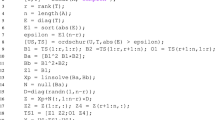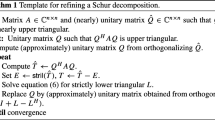Abstract
Singular is a comprehensive and steadily growing computer algebra system, with particular emphasis on applications in algebraic geometry, commutative algebra, and singularity theory.
Singular provides highly efficient core algorithms, a multitude of advanced algorithms in the above fields, an intuitive, C-like programming language, easy ways to make it user-extendable through libraries, and a comprehensive online manual and help function.
Singular’s core algorithms handle Gröbner resp. standard bases and free resolutions, polynomial factorization, resultants, characteristic sets, and numerical root finding. Symbolic-numeric solving in Singular starts with a decomposition to a triangular system or the primary decomposition of (the radical of) an ideal. New developments for primary decomposition will be presented in this paper: identifying sub problems allows an early split of the radical. A primary decomposition of these sub problems can be lifted to (not necessary primary) decomposition of the original problem: the subsequent primary decomposition will be faster.
After the symbolic preprocessing numerical solving of these smaller and easier to solve systems can be achieved by Singular’s implementation of Laguerre’s algorithm or by integrating other systems.
Access this chapter
Tax calculation will be finalised at checkout
Purchases are for personal use only
Similar content being viewed by others
References
Czapor, S.R.: Solving algebraic equations: combining Buchberger’s algorithm with multivariate factorization. J. Symb. Comp. 7(1), 49–53 (1998)
Eisenbud, D., Huneke, C., Vasconcelos, W.: Direct methods for primary decomposition. Invent. Math. 110, 207–235 (1992)
Decker, W., Greuel, G.-M., Pfister, G.: Primary decomposition: algorithms and comparisons. In: Greuel, G.-M., Matzat, B.H., Hiss, G. (eds.) Algorithmic Algebra and Number Theory, pp. 187–220. Springer, Heidelberg (1998)
Decker, W., Greuel, G.-M., Pfister, G., Schönemann, H.: Singular 4-0-3 – A computer algebra system for polynomial computations
Shimoyama, T., Yokoyama, K.: Localization and primary decomposition of polynomial ideals. J. Symb. Comp. 22, 247–277 (1996)
Author information
Authors and Affiliations
Corresponding author
Editor information
Editors and Affiliations
Rights and permissions
Copyright information
© 2016 Springer International Publishing Switzerland
About this paper
Cite this paper
Schönemann, H. (2016). Primary Decomposition in Singular . In: Greuel, GM., Koch, T., Paule, P., Sommese, A. (eds) Mathematical Software – ICMS 2016. ICMS 2016. Lecture Notes in Computer Science(), vol 9725. Springer, Cham. https://doi.org/10.1007/978-3-319-42432-3_26
Download citation
DOI: https://doi.org/10.1007/978-3-319-42432-3_26
Published:
Publisher Name: Springer, Cham
Print ISBN: 978-3-319-42431-6
Online ISBN: 978-3-319-42432-3
eBook Packages: Computer ScienceComputer Science (R0)




